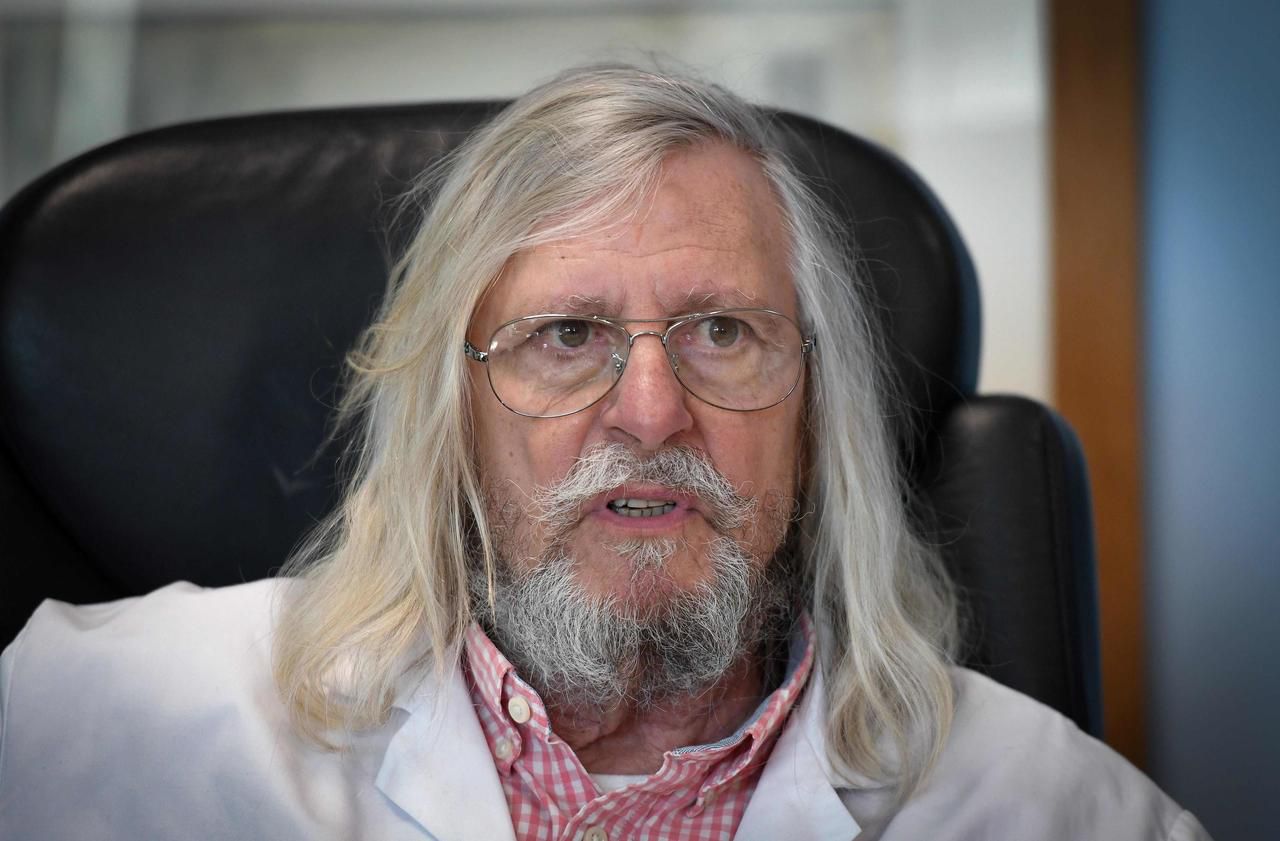For a few weeks, he was everyone's man. But long before the Covid-19 crisis, the name of Didier Raoult, not yet become one of the media figures of the coronavirus crisis, was already displayed everywhere in other types of journals, more distant from the general public.
In the field of infectious diseases, the future champion of chloroquine in France is even, as of 2017, "the European researcher whose publications have been most cited by the international community", like his establishment, the famous University Hospital Institute ( IHU) Méditerranée Infection de Marseille (Bouches-du-Rhône), highlights this on its website.
The iconoclastic researcher owes this visibility to the influence of his work, recognized by his peers, but also to their profusion. The research “Mbappé” - he once compared himself to the talented football player - continues the publications at an astonishing rate. Its name appears systematically on more than a hundred studies per year. In all, the PubMed database accounts for more than 1,800.
Puzzled, researchers, some of whom prefer to remain anonymous, looked into the mechanics which allow the Marseillais to claim several articles per month, when some do not arrive there in a year. And they take offense at the completely legal system that they have uncovered.
A third of Raoult's articles
A significant part of the mountain of scientific articles signed by Didier Raoult is published in journals in which sit… his own subordinates. Longtime colleagues and right-handers, who sometimes even take over the decisive role of chief editor.
This is for example the case of the review "New Microbes And New Infections". According to calculations available online, this title alone has published nearly 230 articles by the Marseille expert since 2014. That is about a third of the journal's total production, and almost six times more than the second journal. which counts the most writings of the professor.
Newsletter - The essentials of the news
Every morning, the news seen by Le ParisienI'm registering
Your email address is collected by Le Parisien to allow you to receive our news and commercial offers. Find out more
PODCAST. Discover our portrait of Didier Raoult
Its chief editor is none other than "the oldest" of the "collaborators" of Didier Raoult, with whom he has worked "for 35 years", and his own assistant within the IHU. Contacted, Michel Drancourt did not respond to our requests.
"Most of the articles in this review deal with the discovery of new bacterial species," the Institute claims. However, Didier Raoult has developed a technique which has made it possible to increase the number of bacteria known in humans by one third. An influence such as a kind of bacteria has also been baptized "Raoultella" in honor of the professor, winner of prestigious scientific prizes.
"New Microbes And New Infections" is not the only title concerned, however. Of the 24 journals that have published 10 or more articles, signed by the Ponte Marseille, almost half assigns IHU members editorial functions, including that of chief editor.
"Unproven Charges" and "Speculation" for the IHU
Professor Francis Berenbaum, hospital rheumatologist and researcher at the Saint-Antoine Research Center in Paris, deplores a "risk of cronyism". "When a team sends its work to a review held, ultimately, by itself, it is characteristic of the conflict of interest", points out the one who has been criticized several times in the press shots of his colleague.
Neurologist and president of the Inserm ethics committee, Hervé Chneiweiss cannot "help but think that the presence of direct collaborators and co-authors in the editorial board not only guides but facilitates" the publication of articles.
"It seems that Didier Raoult has set up a publication system for his own benefit," he deciphers. The professor, commander of the National Order of Merit and officer of the Legion of Honor, would have done in this "only imitate American researchers, even if he does, it seems to me, at a even larger scale ”.
When questioned, the IHU scanned "accusations without evidence" and "speculation" on a possible collusion. The question is all the more burning that beyond his personal influence, the number of publications signed by each researcher has direct consequences on the powers of the State that his hospital group will perceive. And there is almost a billion euros at stake there every year.
Since 2006, the Directorate-General for Health Care has distributed this envelope to health establishments that have carried out research work. And it chose, as the main indicator of this activity, the number of publications signed by the researchers of each establishment.
In the case of the IHU teams, it is the Public Assistance - Hospitals of Marseille (AP-HM) which receives the state grants. The IHU ensures that there is then "no redistribution system" between the two entities. Requested, the AP-HM remained unreachable.
"Boost your score"
Depending on the classification of the journal and the rank of the author in the study, each publication earns from 1 to 32 points, each point being worth almost 600 euros per year for four years. Each article signed by Didier Raoult in the “International Journal Antimicrob Agents”, whose editor-in-chief works within his IHU, thus brought in from 3,600 euros to 14,400 euros per year for the AP-HM. Since 2014, it has initialed around forty.
At the Lille University Hospital (North), Patrick Devos, statistician, himself helped to set up this points system called Sigaps. "The questions that circulate on the merits of these practices are legitimate", he judges, wondering about the possibility of a "roundabout way to boost his score".
The institute justifies these links by the "significant share" of its researchers "among the best in Europe in infectious disease". "If you look at the list of journals on infectious diseases, the members of the IHU are often members of the editorial committee there, simply because the IHU is an important center", it argues.
VIDEO. When Emmanuel Macron visited Professor Raoult
Signature strike
This strike force and the financial windfall it generates allow in any case the IHU and its boss to enjoy a lever of influence within their structure. In 2017, the scientific production of the AP-HM was "largely carried by the IHU", which alone reported, that year, "20%" of the points at its establishment, for only "3% of researchers du CHU ”, as he prides himself on his site.
In the book “The IHU Mediterranean Infection - The Challenge of Integrated Research and Medicine” (Michel Lafon, 2018), Didier Raoult admitted to journalist Hervé Vaudoit to have “threatened to strike signatures” for obtain his institute when he only had a pole dedicated to infectious diseases. "It was from this moment that we were finally able to sit down at the table to discuss quietly," he says.
According to Hervé Maisonneuve, doctor and former president of the European Association of Science Editors ( NDLR : European Association of Science Editors), basing the performance indicators of researchers on "a volume of publication" would naturally lead to this genre of behavior, in a restricted environment where the great figures of prow know each other.
Court of Auditors alert
"I am very much opposed to what Didier Raoult is doing," he condemns. But he plays the system well. It is not the only one, but it does, say, in more visible proportions, with large hooves. It must be said that no body is responsible for monitoring or preventing any collusion that may exist between authors of articles and the journals that publish them.
Research ethics committees seem to exist. One of them is even specifically specialized in the field of infectious and tropical diseases. But in the absence of a legal framework, positions remain rare. None of its ten members, whom we tried to join, appeared to be available, one of them raising only a "very hot topic".
As it stands, only potential internal regulations for publishers prevail. Elsevier, the editorial group that owns the two journals cited in particular, assures that its policy prohibits publishers from being "involved in decisions on their own articles, on the articles of family members and colleagues". And refers to the independence of the reviewers responsible for guiding the editorial committees in their choices.
Aware of the flaws in this system, the Court of Auditors urged the authorities, in a report delivered in December 2017, to "modify without delay the methods of allocating revenue" linked to research. The indicators linked to the famous points "appear insufficiently discriminating according to the quality of research", she worries, and "are not subject to sufficient controls".
Asked about a possible reflection initiated since on the subject, the Ministry of Health could not answer. Didier Raoult, whose institute told us that he would not give us an interview, remains a supporter of the famous point system. Its implementation, he wrote in 2017 in his book "Better to cure than to predict" (Michel Lafont), "plays a positive role in the restructuring of the French scientific landscape".
"Personal endowment in cash"
The researcher also praises "a policy of direct funding for publication" similar to those practiced, he says, by "China, Turkey and Korea". "As well as high-level athletes who succeed in a competition, the author has a personal endowment in cash," he said.
Still also iconoclastic, the specialist even imagines establishing, within his IHU, "a bonus directly linked to publication in a high-level newspaper, without going through any committee". A position that directly opposes the Declaration of San Francisco on the evaluation of research.
Signed by several hundred scientific organizations, including Inserm in France, it invites us to "evaluate research on its intrinsic value rather than on the basis of the journal in which it is published". "There is an urgent need to improve the methods of evaluating the results of scientific research by funding agencies," she asks. The AP-HM, which primarily benefits from the abundant prose of Didier Raoult and his teams, may not share this opinion.















